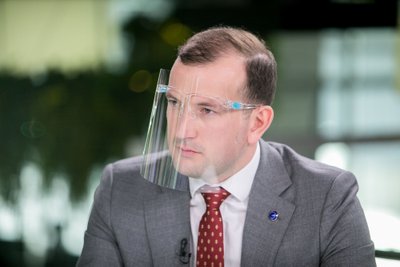“Gas does not constitute a weak point for Lithuania, considering the LNG [liquefied natural gas] terminal. But dependence on electricity is a major problem in Lithuania. In this case, it is necessary to implement synchronization as soon as possible as it is the biggest problem of Lithuania,” he told BNS on Tuesday after the European Commission proposed measures expected to reduce the European Union’s (EU) dependency on Russian gas by two-thirds by the end of the year.
According to the commissioner, the objective set out by the Commission would be achieved by purchasing gas from alternative markets as well as by speeding up, as much as possible, the transition from fossil fuels to alternative sources of energy.
“First of all, Russian gas should be eliminated from the European Union’s market as soon as possible, that’s for sure. However, this must be done while ensuring the stability of the energy system and adequate prices for consumers and while implementing the climate change objectives simultaneously,” Sinkevicius said.
The commissioner singled out infrastructure and, more specifically, capacities to receive LNG cargoes, as the weakest element in the transition to alternative sources of gas imports.
According to Sinkevicius, the sources of gas imports that were being considered included the United States or Qatar, which could send LNG cargoes, as well as Azerbaijan, Algeria and Norway, which could supply gas to Europe by pipelines. However, the EU could only get half of the necessary gas volume from such sources.

“The most important here is to have where to deliver that gas from and that’s not a simple task. Dependence on Russia exceeds 155 billion cubic meters. Now, when we are talking about the alternative from the United States and Qatar, the volume of liquefied gas from there could reach approximately 50 billion [cubic meters] plus an extra 10 billion [cubic meters] from Azerbaijan, Algeria, Norway and perhaps additional 10 billion cubic meters from those countries after adopting various decisions,” he said.
The Commission’s proposal also called for 90 percent of gas storage capacity in the EU to be filled by October 1, the commissioner stated.
“The Commission is ready to help member states fill their gas storage facilities, for instance, through joint procurements, collection of orders, coordination of supply,” Sinkevicius added.
The European Commission on Tuesday set out the objective to reduce the Union’s dependence on gas imports from Russia by two-thirds by the end of this year and to make the EU fully independent of Russian gas, oil and coal by 2030.
